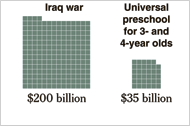What Would You Do With $1.2 Trillion?
[Ed. note: The graphic at right is also from The Times showing the annual cost of the Iraq war (however, this can only be an estimate since the Bushies hide much of the war expenditure).]
Writes Pudentilla at Skippy International:
hey kids,Now let's take a look at The Times article by David Leonhardt to which she refers (I'll give you three (3) guesses how the Bushies have spent it, and the first 21 don't count):
what would you buy if you had a trillion dollars? We know aWol would buy destruction and devastation - but how about you? healthcare for all americans? energy resources that don't force the u.s. to rely on tyrannies? decent schools? what would you buy?
The human mind isn’t very well equipped to make sense of a figure like $1.2 trillion. We don’t deal with a trillion of anything in our daily lives, and so when we come across such a big number, it is hard to distinguish it from any other big number. Millions, billions, a trillion — they all start to sound the same.
Likewise, some of their cost estimates — like those covering health care and disability payments for veterans — have risen since the article appeared.
At the outset of the war, William Nordhaus, an economist at Yale, wrote an essay examining why countries typically underestimate the cost of wars.
The way to come to grips with $1.2 trillion is to forget about the number itself and think instead about what you could buy with the money. When you do that, a trillion stops sounding anything like millions or billions.
For starters, $1.2 trillion would pay for an unprecedented public health campaign — a doubling of cancer research funding, treatment for every American whose diabetes or heart disease is now going unmanaged and a global immunization campaign to save millions of children’s lives.
Combined, the cost of running those programs for a decade wouldn’t use up even half our money pot. So we could then turn to poverty and education, starting with universal preschool for every 3- and 4-year-old child across the country. The city of New Orleans could also receive a huge increase in reconstruction funds.
The final big chunk of the money could go to national security. The recommendations of the 9/11 Commission that have not been put in place — better baggage and cargo screening, stronger measures against nuclear proliferation — could be enacted. Financing for the war in Afghanistan could be increased to beat back the Taliban’s recent gains, and a peacekeeping force could put a stop to the genocide in Darfur.
All that would be one way to spend $1.2 trillion. Here would be another:
The war in Iraq.
In the days before the war almost five years ago, the Pentagon estimated that it would cost about $50 billion. Democratic staff members in Congress largely agreed. Lawrence Lindsey, a White House economic adviser, was a bit more realistic, predicting that the cost could go as high as $200 billion, but President Bush fired him in part for saying so.
These estimates probably would have turned out to be too optimistic even if the war had gone well. Throughout history, people have typically underestimated the cost of war, as William Nordhaus, a Yale economist, has pointed out.
But the deteriorating situation in Iraq has caused the initial predictions to be off the mark by a scale that is difficult to fathom. The operation itself — the helicopters, the tanks, the fuel needed to run them, the combat pay for enlisted troops, the salaries of reservists and contractors, the rebuilding of Iraq — is costing more than $300 million a day, estimates Scott Wallsten, an economist in Washington.
That translates into a couple of billion dollars a week and, over the full course of the war, an eventual total of $700 billion in direct spending.
The two best-known analyses of the war’s costs agree on this figure, but they diverge from there. Linda Bilmes, at the Kennedy School of Government at Harvard, and Joseph Stiglitz, a Nobel laureate and former Clinton administration adviser, put a total price tag of more than $2 trillion on the war. They include a number of indirect costs, like the economic stimulus that the war funds would have provided if they had been spent in this country.


|